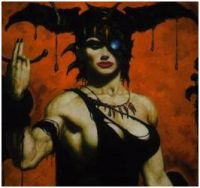Loviatar
| Loviatar | |

| |
| Tenets | Vengeance, Wisdom, and Pain |
| Status | Active |
| Religious Symbols | |
| Animal | spider |
| Plant | spiked cactus |
| Food | blowfish |
| Refectory | |
| Food | Unknown |
| Drink | Unknown |
| Acceptable Axes | |
Loviatar is a truly frightening goddess. Her activities never cease to shock and amaze all the other deities of the Aether, and her memory seems to be infinite. She never forgets when she is wronged, and she is ever crafting plots of revenge even for acts done millennia in the past.
The other deities also marvel at the extent to which her mind can develop such twisted and horrific methods of delivering her brand of justice. It is not the methods themselves that frighten or shock them, but the intensity of pleasure she derives from her devices.
The source of Loviatar's profound obsession with vengeance is unknown. Erosia postulates that Loviatar was spurned by an ancient mortal lover, and thus, she feels a profound connection with any being, mortal or immortal, with a score to settle. All of the Aether are often mystified by the ways Loviatar utilizes to mete out her vengeance, for her methods are creative as well as fitting. They all have been known to seek her counsel when it comes to her area of extreme expertise regardless of alliances and affinities. All Lovites are utterly obsessed with revenge. If they are wronged, they will do whatever it takes, no matter how long it takes, to achieve restitution in their eyes. Seeking revenge is rapturous pleasure for Lovites, and they frequently give counsel to other mortals (usually requiring a donation to their faith church) who pursue revenge. This is done not only to please Loviatar but, also, for the sheer joy of delivering justice. Lovites, however, do not seek vengeance for mere trifles, for they believe vengeance is a sacred event, reserved for those who truly deserve it. Many a mortal who has wronged another constantly watch over their shoulders, never knowing when Loviatar might strike through one of her faithful.
In times past, Loviatar and Gethsemane were closely aligned. At certain times in history they have been referred to as twins. Their relation came from the fact that their actions were oddly and ironically circular. Acts of deceit and treachery frequently generate a powerful compulsion in mortals to seek retribution. Similarly, such vituperative acts of vengeance are often delivered in the form of unspeakable acts of treachery. Despite the fact that the philosophies of these two faiths sometimes lead into one another, Loviatar and Gethsemane differ enormously. Loviatar is known to be a firm believer in justice. Some feel that her type of justice lacks the important elements of mercy or a desire for rehabilitation. Lovite philosophy has a very simple response to this: Justice is about punishment and setting things right. Whether the target learns to change his or her behavior is not relevant. What matters most is that the target wallow in misery and regret for whatever acts necessitated the revenge. If the individual happens to be reformed by the deliverance of revenge, that is merely a fortuitous coincidence. Despite the harshness of Loviatar's implacable philosophy, her faith has much in common with that of the law. This fact is yet another element of Lovite religion that prevents Loviatar and Gethsemane from being as closely aligned as they might otherwise be.
Once the mistress of disease, Loviatar abandoned that cause to Set during the Aetherial shift as she was drawn more towards pondering the ways of the world and society. She delved into the workings of mortals and their often aimless actions, watching as they stumbled into one disaster after another. In their reckless and often thoughtless movements, Loviatar saw mortal after mortal make quick decisions that often brought their own demise. It is rumored that she saw similarities in the behavior of some of the pantheon and vowed never to succumb to such mindless activities. After eons of carefully plotting each and every move in her plans for revenge, her movements towards wisdom in one's actions were quite natural. She also spoke on the importance that all beings continually examine their existences lest they repeat their mistakes and wallow eternally in the same failures. Such examinations bring wisdom and allow all beings to grow stronger and more worthy of their place in the cosmos. She preached that vengeance is an example of this, for it teaches both giver and receiver that actions can have dire consequences. She then declared that heretofore, she would be known as Loviatar, Goddess of Vengeance, Wisdom, and Pain.
Loviatar rewards her clerics for assisting others in seeking revenge, especially when the revenge will likely trigger subsequent quests for vengeance. Loviatar loves revenge that perpetuates itself. She also is pleased when clerics develop new ways to spread misery, suffering, and melancholy to the mortal realm. Simple death or murder, however, is unimaginative and generally does not involve much suffering. It is far preferable to destroy a person but leave the individual with enough so that he or she can fully comprehend the full woefulness of his or her existence.